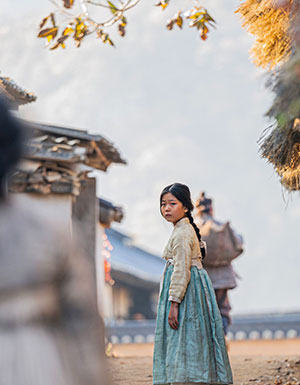Epic in scope and intimate in tone, “Pachinko” begins in 1915, blooms into a forbidden romance, and crescendos into a sweeping saga that journeys between Korea, Japan and America, to tell an unforgettable story of war and peace, love and loss, triumph and reckoning.
To help keep this site running: Willow and Thatch may receive a commission when you click on any of the links on our site and make a purchase after doing so.
Showrunner Soo Hugh based “Pachinko” on Min Jin Lee’s 2017 New York Times bestselling novel of the same name, which follows one family across four generations; American composer Nico Muhly composed the original music for the 2022 Apple TV+ original series.
Below, we talk with Nico Muhly, who writes orchestral music, works for the stage, chamber music and sacred music, as well as film scores, including “The Reader “(2008), and the BBC adaptation of “Howards End” (2017).
WAT: Hi Nico, thank you so much for taking the time to talk with us. We just loved “Pachinko,” and not to too be corny, but the music was pitch-perfect. The narrative traverses Korea, Japan, and America over more than 70 years, and unfolds in a non-linear synergy. Did your music need to act as a glue so the story made sense to the viewer? Or was the music’s role more about helping everything coalesce on a deeper level?
Nico Muhly (NM): First of all, thank you for these questions. And also thank you for doing what you do; I’ve long thought somebody needed to focus on period dramas. Yes: when I first read the script, I was surprised and excited about the fact that the time periods were on shuffle. Dramatically, it works incredibly well, but it requires some kind of emulsifying agent to make sure it didn’t feel chaotic. The score had to do that work, and in a sense, that challenge became the governing force behind my approach: instead of themes that belonged to time periods, or sound worlds that belonged to time periods, there needed to be a sense of genetic connection between the material.
WAT: Oh thank you, that’s so nice to hear that you appreciate Willow and Thatch. I’m wondering if there was something you specifically didn’t want the “Pachinko” score to do?
NM: The main thing I didn’t want it to do was to use instruments from that time or place. It would have been inappropriate, for one, for me as a white American person to even step a toe into that sonic landscape, and I felt it was smart to stay in my lane. There are so many places where we are invited to see these women (primarily) as ourselves: hanging on to memories and to a home we might never see again. I think the term “universal” is way too loaded with covert racism to use here, but I think there is a generosity with how the show is made where it’s very historically rooted, but seen through a larger lens when it needs to be.
WAT: Throughout the entire series, the settings are visually rich, and the cinematography is elegant, but nothing feels gratuitous, including the score. “Pachinko” is an emotional story, and it is epic in scope, but your music wasn’t about grand swells. Overall the music use feels judicious, and there are many, many moments where we hear natural sounds, or conversation, without music, but almost as music. Then there are these moments, like when the grandmother is washing the rice, when it felt important that the music was whispering something very specific to the viewer.
NM: I think the success of the mix has to do with Luciano, Martin, and Suzana Perić. Suzana, in particular, has a preternatural ability to figure out exactly how dense the music should be (which is to say, how much stuff is happening all at once), and she, Luciano, and Martin made something incredibly elegant. The rice scene was a tricky one, because it’s so emotionally important, and needed to be exactly the right balance between score and sound.
WAT: “Pachinko” opens in 1915, just after the start of the historical Japanese occupation of Korea, and moves through the 20s and 30s, and all the way into the 1980s. You’ve composed for period dramas before, like “The Reader” and the BBC mini-series “Howards End” (2017). Can you talk about some of the demands specific to composing for a story that is set in the past? Was there anything these three projects had in common because they are set in other eras? And as Willow and Thatch is dedicated to the period drama, we have to ask if you have favorites that you’d recommend to our readers.
NM: That’s a good question — I think at a certain point you need to just accept the fact that you’re not writing a documentary. And even if you were, I suppose, you’d want the music to reflect the fact that people are watching it from their homes on their laptops; there’s an acknowledgement that the experience can’t be immersive in that way, and that we should own, in some sense, the artifice of it being a modern experience. I think a fantastic example of this is the Michael Nyman scores he made with Peter Greenaway — The Draughtsman’s Contract is a fantastic example of a period piece that weaves older material (some borrowed from Purcell etc.) with a more contemporary sound (bass guitar, saxophones). I think Brideshead Revisited is a fantastic period piece (with a delicious score), The Crown… but I wonder when things that happened in the 80s are going to start to feel like period pieces; certainly something like The Godfather must read as period to today’s audiences? That’s 50 years ago, so, at the time it was made, that’s the same distance from now as the 20s were then.
WAT: “The Draughtsman’s Contract” sure was something. It’s not for everyone but I loved it, though that’s not surprising as in college I was fascinated by Greenaway’s non-period “Drowning by Numbers.” starring Joan Plowright. The multiple time periods in “Pachinko” work together narratively, and at times we see the different eras in quick succession, with the same music. I loved this, as at some point the stories started to feel like they were happening in parallel. There are several overlapping scenes in Chapter 4, where characters in different places are all experiencing heartbreak, while in another era a grandmother is making a radical decision based on the past. The use of electronic music feels eerie and atmospheric, and otherworldly. Can you talk about your decision to mix traditional instruments with synthesized sounds?
NM: I thought that once I was “owning,” as it were, the artifice of this being a modern story which happens to take place in the past, there needed to be some kind of stylised acknowledgement of this fact. My music certainly doesn’t sound historical, but I thought that weaving something electronic, however subtle, through the score would allow a sense of modernity to seep through it.
WAT: Those scenes open up into a mad dash of freedom in the cleansing rain, the soundtrack an amplification of breath and footsteps. Suddenly we land in an upbeat performance of contemporary song lead by strong percussion that drives the next scenes. How aware were you of the other music in the show? And when you were composing the score, did you already know about the choice of music for the opening credits, The Grass Roots 1967 hit “Let’s Live for Today”? How does having —or not having— insight like that affect your work?
NM: I’m going to be honest with you, which is to say that even the process of starting to engage with the source music is a wormhole down which the composer shouldn’t enter. I loved how it worked in Pachinko — particularly the opening credits. However, I think in every project I’ve ever done, there are source cues which I’d much rather be score, but as they’re baked into the script, it’s not my place to meddle. Source is expensive, too, and one often has the sense that that money might be better spent on out-of-work musicians, whose lives were ravaged by this virus, than on adding to what I expect are already substantial sync licenses for already well-known artists. But: that’s not my call.
WAT: Can you talk about your working method in general? There are countless moments like when we see a bird in the sky, or the ferry turning during the emerging love story, and it feels like that accompanying music could only have been composed after seeing the final cut.
NM: This project was a little bit of everything. Mostly I was writing to nearly finished picture, but I actually started writing when they were sending me dailies from set, just because the schedule was intense and I wanted to make sure the editorial team had my music as soon as possible. Suzana Perić, the music editor, was extraordinary in figuring out these little subtleties of spotting; Soo was unbelievably precise about it, while still giving me room to do my own thing; it was a really magical combination.
WAT: The characters in “Pachinko” endure an incredible amount of hardship, but for the most part the series isn’t oppressive to watch, partly because of the music. But Chapter 7, set in 1923, was one episode that likely weighed heavily on everyone who saw it. Was this a particularly challenging episode to compose for?
NM: Episode 7 was intense! It also has very little score, and what is there is very visceral. There are some instruments featured here which are usually buried, and I tried to make the music as shocking as the visual shift in style from the other episodes. It was definitely a challenge!
WAT: I actually went back and watched Episode 7 right after I saw it, because in my mind there was no music for at least the first 20 minutes, but then I saw that it was just as you say: visceral. My mind and body absorbed the sounds in a new way. It is wonderful news that “Pachinko” has been renewed for a second season. Word is that Season 2 may focus on a third generation of characters including Sunja’s sons Mozasu and Noa, and could “also build on Solomon’s self-discovery and Koh Hansu’s redemption.” Do you know if you will be returning? Is it too early for you to have a vision for the score?
NM:
Sha-la-la-la-la-la, live for today
And don’t worry ’bout tomorrow, hey
Sha-la-la-la-la-la, live for today
Live for today
WAT: Fair enough! We know our readers will be excited to watch “Pachinko,” and spend some time in the unforgettable world you helped create. Thank you again!
Told in Korean, Japanese, and English, “Pachinko” (2022) stars Youn Yuh Jung, Lee Minho, Jin Ha, Minha Kim, Anna Sawai, Jung Eun-chae, Inji Jeong, Jimmi Simpson, Junwoo Han, Kaho Minami, Steve Sanghyun Noh, Soji Arai and Yu-na Jeon. Rated TV-MA Watch the trailer below.
If you enjoyed this post, wander over to The Period Films List. Also see Kate Phillips Q&A: Being Miss Scarlet, and A Place to Call Home: Carolyn & Jack Q&A.

